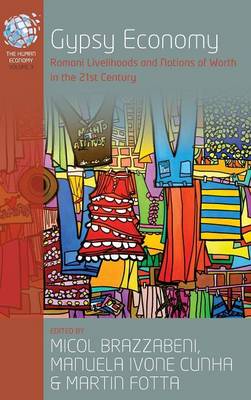
Stock image for illustration purposes only - book cover, edition or condition may vary.
Gypsy Economy: Romani Livelihoods and Notions of Worth in the 21st Century
Micol Brazzabeni (Ed.)
€ 156.48
FREE Delivery in Ireland
Description for Gypsy Economy: Romani Livelihoods and Notions of Worth in the 21st Century
Hardback. Roma and Gypsy economic arrangements are complexly related to social position. Authors ethnographically studied these complexities, exploring how, despite - or perhaps because of - their unstable and ambiguous position within the market economy, Roma and Gypsy communities continuously re-create more or less viable economic strategies. Editor(s): Brazzabeni, Micol; Ivone Cunha, Manuela; Fotta, Martin. Series: The Human Economy. Num Pages: 268 pages. BIC Classification: JFSL1; JHMC; KC. Category: (UP) Postgraduate, Research & Scholarly. .
Economic arrangements of Romanies are complexly related to their social position. The authors of this volume explore these complexities, including how economic exchanges forge key social relationships of gender and ethnicity, how economic opportunities are constructed and seized, and how economic success and failure are transformed into attributes of social persons. They explore how, despite - or perhaps because of...
Read moreProduct Details
Publisher
Berghahn Books United Kingdom
Number of pages
268
Format
Hardback
Publication date
2015
Series
The Human Economy
Condition
New
Weight
553g
Number of Pages
272
Place of Publication
Oxford, United Kingdom
ISBN
9781782388791
SKU
V9781782388791
Shipping Time
Usually ships in 15 to 20 working days
Ref
99-15
About Micol Brazzabeni (Ed.)
Micol Brazzabeni is a Postdoctoral Research Fellow at CRIA-IUL, Lisbon. She is the author of La Scuola di Carta (2008) and a co-editor of Etudes Tsiganes, Special Issue Emotion and Place (2012). Manuela Ivone Cunha is a Professor at the University of Minho and a Senior Research Fellow at CRIA-UMinho. She has authored and edited several publications on the social...
Read moreReviews for Gypsy Economy: Romani Livelihoods and Notions of Worth in the 21st Century
All in all, the edited volume is a valuable contribution to Gypsy Studies and beyond, especially because the editors and the majority of contributors maintain awareness of the semantic emptiness of the term ethnic in reference to the Roma.
Journal of Gypsy Studies The publication of Gypsy Economy comes precisely at a time when both academics and the...
Read moreJournal of Gypsy Studies The publication of Gypsy Economy comes precisely at a time when both academics and the...
